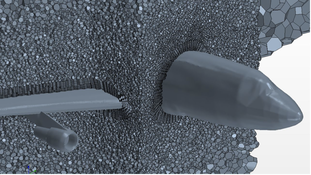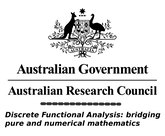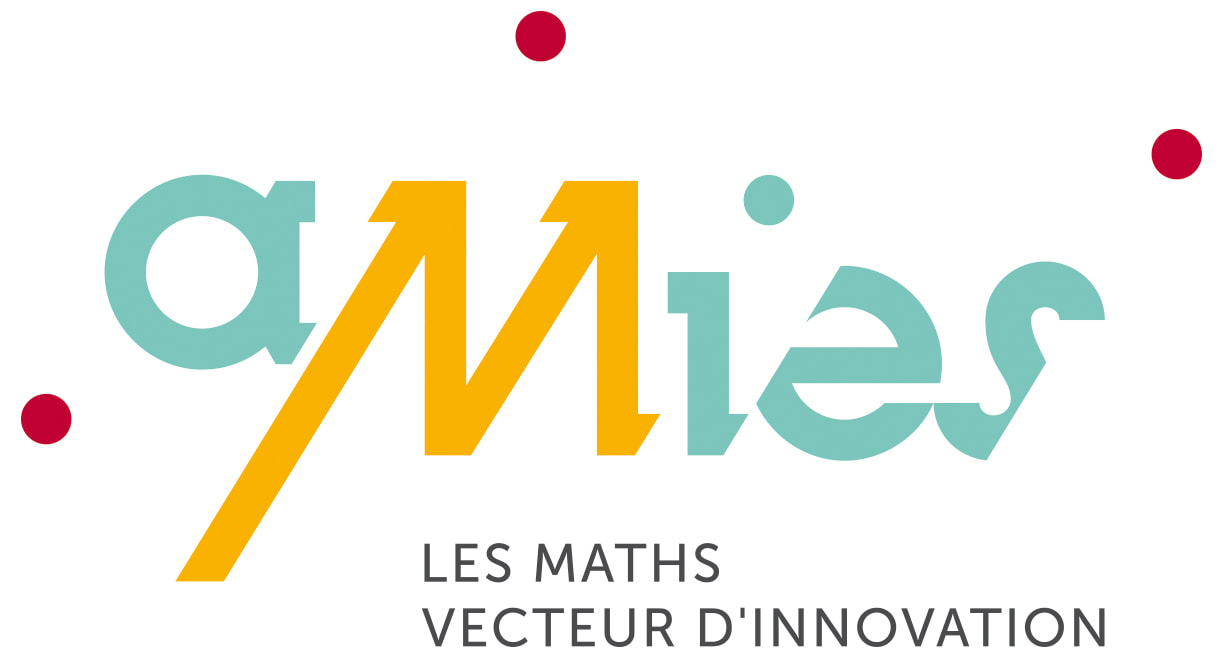|
Scientific Committee
Comité scientifique Franco Brezzi (IMATI CNR Pavia) |
Organizing Committee
Comité d’organisation Paola Antonietti (Politecnico di Milano) Lourenço Beirão da Veiga (University of Milan-Bicocca) Daniele Di Pietro (Université de Montpellier) Jérôme Droniou (Monash University) Stella Krell (Université Nice Sophia Antipolis) |
|
The study of numerical methods for the approximation of Partial Differential Equations (PDEs) on polygonal and polyhedral meshes is drawing the attention of an increasing number of researchers. Indeed, polytopal grids offer a very convenient framework to handle, for instance, hanging nodes, different cell shapes within the same mesh and nonmatching interfaces. Such a flexibility represents a powerful tool towards the efficient solution of problems with complex inclusions (as in geophysical applications) or posed on very complicated or possibly deformable geometries (as encountered in basin and reservoir simulations, in fluid-structure interaction, crack propagation or contact problems). In recent years, several discretization methods for polygonal and polyhedral meshes have been developed and there are strong connections among them. The aim of this Workshop is to bring together experts and young researchers in this field in order to discuss the most recent developments and to establish common grounds and shared goals.
Particular attention will be paid to industrial applications of polyhedral methods, which will be discussed during a dedicated session. |
L’étude des méthodes numériques pour l’approximation des équations différentielles partielles (EDP) sur les maillages polygonaux et polyédriques attire l’attention d’un nombre croissant de chercheurs. En effet, les maillages généraux offrent un cadre très pratique pour manipuler, par exemple, des noeuds non-conformes, des formes de mailles différentes dans le même maillage et des interfaces non conformes. Une telle flexibilité représente un outil puissant pour la résolution efficace de problèmes avec des inclusions complexes (comme dans les applications géophysiques) ou posés sur des géométries très compliquées ou éventuellement déformables (telles que rencontrées dans des simulations de bassin et de réservoir, en interaction fluide-structure, propagation de fissures ou problèmes de contact). Ces dernières années, plusieurs méthodes de discrétisation des maillages polygonaux et polyédriques ont été développées et il existe de fortes connexions entre elles. Le but de ce workshop est de rassembler des experts et des jeunes chercheurs dans ce domaine afin de discuter des développements les plus récents et d’établir des points communs et des objectifs communs.
Une attention particulière sera portée aux applications industrielles des méthodes polyédriques, qui seront discutées lors d’une session dédiée. |
Jérôme Bonelle (EDF R&D) – Polyhedral discretizations for industrial applications
Susanne C. Brenner (Louisiana State University) – Some New Estimates for Virtual Element Methods
Erik Burman (University College London) – Hybrid High-Order Methods on Unfitted Meshes
Claire Chainais-Hillairet (Université de Lille) – A free energy diminishing DDFV scheme Ωfor convection-diffusion equations
Bernardo Cockburn (University of Minnesota) – Superconvergence by M-decompositions
Robert Eymard (Université Paris-Est Marne-la-Vallée) – The Gradient Discretisation Method: Tools and Applications
Jean-Claude Latché (Institut de Radioprotection et de Sûreté Nucléaire) – On kinetic energy preserving convection operators on general
Donatella Marini (University of Pavia) – Applications of Virtual Elements
Ilaria Perugia (University of Vienna) – Non standard VEM for the Helmholtz problem
Alessandro Russo (University of Milano-Bicocca) – Virtual Element Methods: recent developments and perspectives
Peter Wriggers (Leibiz University) – Virtual Elements for Finite Strain Problems in Plasticity
Contributed talks
Edoardo Artioli (University of Rome – Tor Vergata) Asymptotic homogenization of random fibre-reinforced composites: a numerical approach based on virtual element technology and a posteriori error estimation
Stefano Berrone (Polytechnic University of Turin) Virtual Element Methods in subsurface simulations
Sivia Bertoluzza (CNRS CNR) Building geometrically robust stabilisation term for VEM
Stéphane Bordas (University of Luxembourg) Displacement-based formulations over star convex polytopes: strain smoothing and scaled boundary finite elements
Lorenzo Botti (Polytechnic University of Turin) Multi-level solution strategies for dG and HHO discretizations
Andrea Cangiani (University of Nottingham) A posteriori error analysis and mesh adaptivity for Virtual Element Methods
Carsten Carstensen (Humboldt University, Berlin) Skeletal schemes for eigenvalue localisation?
Heng Chi (Georgia Tech Topology optimization with VEM
Alessandro Colombo (Université de Bergamo) On the development of an efficient order-adaptive DG method for the simulation of turbulent flows
Franco Dassi (University Milano – Bicocca) Divergence-free Virtual Element Method for Stokes and Navier-Stokes problems in three dimensions
Daniel Di Pietro (Université de Montpellier) Hybrid High-Order methods for elasticity
Emmanuil Georgoulis (University of Leicester) Discontinuous Galerkin methods for curved elements
Andrew Gillette (University of Arizona) Basis construction techniques for serendipity-type spaces
Frank Hülsemann (EDF R&D) Impact of robust discretizations on linear solvers
Erell Jamelot (CEA France) TrioCFD: code & numerical schemes
Simon Lemaire (Inria Lille – Nord Europe) A unified formulation and analysis of HHO and VE methods
Alexander Linke (Weierstrass Institute) On high-order pressure-robust space discretisations, their advantages for incompressible high Reynolds number generalised Beltrami flows and beyond
Konstantin Lipnikov (Los Alamos National Laboratory) High-order remap methods on curvilinear meshes
Carlo Lovadina (University of Milan) Virtual Element Methods for Linear Elasticity Problems
Alexei Lozinski (Université de Franche-Comte) A primal discontinuous Galerkin method with static condensation on very general meshes
Marco Manzini (Los Alamos National Laboratory) A unified framework for conforming and nonconforming virtual element methods
Ilario Mazzieri (Polytechnic University of Milan) Numerical modeling of elasto-acoustic coupling by a discontinuous Galerkin method on general meshes
Karol Mikula (Slovak University of Technology Bratislava) Finite volume level-set methods on polyhedral meshes
Kyungsoo Park (Yonsei University) Virtual Element Methods for Elastodynamic Problems with Explicit Time Integrations
Marco Verani (Polytechnic University of Milan) The conforming virtual element method for polyharmonic problems
Martin Vohralik (Inria Paris) A simple a posteriori estimate on general polytopal meshes with applications to complex porous media flows
Ivan Yotov (University of Pittsburgh) Higher order multipoint flux mixed finite element methods on quadrilaterals and hexahedra
Poster session
Dibyendu Adak
Laurence Beaude
Michele Botti
Konstantin Brenner
Florent Chave
Andrea Chiozzi
Julien Coulet
Daniel Castanon Quiroz
Alessandro D’Auria
Alessandra Guglielmana
André Harnist
Julian Hennicker
Rekha Khot
Hyungtae Kim
Giulia Lissoni
Sebastian Minjeaud
Sundar Natarajan
Luca Patruno
Daniele Prada
Alexander Pichler
Houssaine Quenjel
Michele Visinoni












